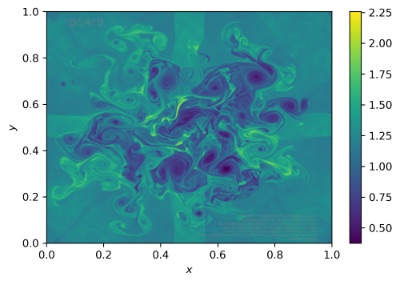Upcoming talks
Tuesday 31 May
Speaker: Elif Ozturk
Title: On the Bitsadze–Samarskii type nonlocal boundary-value problem with the integral condition for an elliptic equation.
Abstract: In this talk, the Bitsadze–Samarskii type nonlocal boundary-value problem with the integral condition for an elliptic differential equation in a Hilbert space H with self-adjoint positive definite operator A is considered. Well-posedness of this problem in Hölder spaces with a weight is established. First and second orders of accuracy difference schemes are presented. The theoretical statements for the solutions of these difference schemes are supported by the results of numerical example.
Past talks
Tuesday 24 May
Speaker: Hao Tang (UiO)
Title: A framework for solving singular SPDEs.
Abstract: Firstly, I will try to discuss the possibility of solving a general type singular SPDEs (including typical models from fluid mechanics, with multiplicative or generalized transport type noise) by a unified framework. Then, to cover SPDEs with generalized transport type noise, I will then discuss the cancellation properties of pseudo-differential operator.
Tuesday 10 May
Speaker: Håkon Hoel (UiO)
Topic: Discrete-time data assimilation: methods, convergence results and challenges
Abstract: Data assimilation (DA) is an umbrella term for methodologies that combine measurement with mathematical models in a probabilistically reasonable way. In DA, the current state of a system given partial and noisy observations is represented by a distribution, where the assimilation of measurements into the distribution is ideally achieved through Bayesian inference. For problems involving complexities, such as high-dimensional state space or nonlinear forward models, DA often has to be approximated by numerical methods. One class of such methods that relate closely to Monte Carlo methods is the ensemble-based methods, consisting of the ensemble Kalman filter and the particle filter. In this talk, I will present the main ideas of ensemble-based methods, cover recent convergence results, and discuss some challenges that remain open.
Tuesday 26 April
Speaker: Marco Petrella (ETH Zürich)
Title: The Discrete Equation Method (DEM) for compressible multiphase fluid flows: towards data driven simulations?
Abstract: Compressible multiphase flow occur in many practical situations where two phases are separated by an interface. Even under the stringent simplification of neglecting mass-transfer and heat conduction, no unique model is generally accepted for the description of two compressible constituents. Indeed, various two phase flow systems may appear to have very little in common, and the tendency has become to develop ad-hoc models, with the prominent example of the Baer and Nunziato (BN) model for the description of the deflagration-to-detonation transition.
We present the discrete equation method (DEM) for two-phase flow in the absence of heat conduction and mass transfer, analyze the resulting probability coefficients and show their local convexity. Moreover, we reformulate the underlying mesoscopic model in terms of a parameter-dependent family of PDEs that interpolates between different flow regimes, and discuss connections to existing models.
Tuesday March 8
Speaker: Peter Pang (NTNU)
Title: Type II blow-ups based on compressible Euler dynamics
Abstract:
In MRRS-NLS, Merle–Raphael–Rodnianski–Szeftel (MRRS) showed the existence of blow-up solutions to the energy supercritical defocusing NLS in a number of different spatial dimensions, starting from a finite-codimension of well-prepared data. They showed this by decomposing NLS into a part that satisfied compressible Euler dynamics and a perturbation, and then by showing that in self-similar variables, the compressible Euler dynamics allowed for the existence of globally smooth solutions, which blow-up in the original variables at a definite rate. Global smoothness in the self-similar variables permitted linear stability analysis in the lead-up to blow-up, so that the remainder of NLS can be treated as a perturbation. In this talk I shall attempt to (1) explain the problem, and (2) pick up and give a tour of the major strand of ideas MMRS-Euler which form the basis of the analysis in MRRS-NLS.
- [MRRS-Euler] F. Merle, P. Raphael, I. Rodnianski, and J. Szeftel. On smooth self similar solutions to the compressible Euler equations. arXiv:1912.10998.
- [MRRS-NLS] ibid.. On blow up for the energy super critical defocusing nonlinear Schrodinger equations. arXiv:1912.11005.
Tuesday 1 March
Speaker: Ulrik Skre Fjordholm
Topic: Grid cells
The 2014 Nobel prize in Medicine was awarded Brian O'Keefe, May-Britt Moser and Edvard Moser for their discovery of so-called place cells and grid cells. These are brain cells, present in many mammals, that are believed to help animals keep track of their location. I will give a quick introduction to this fascinating subject, and I will describe some of the models (PDEs or systems of ODEs) that have been developed to mimic grid cells.
Tuesday 15 February
Speaker: Ola Mæhlen
Title: One sided Hölder regularity of global weak solutions of negative order dispersive equations
Abstract: The majority of dispersive equations in one space-dimension can be realised as dispersive perturbations of the Burgers equation
\(u_t + u u_x = L u_x\)
where L is a local or nonlocal symmetric operator. For negative order dispersion, the Burgers’ nonlinearity dominates and classical solutions break down due to shock-formation/wave-breaking. Using hyperbolic techniques we establish global existence and uniqueness of entropy solutions, with L^2 initial data, for a family of negative order dispersive equations, but our main focus will be on a new generalization of the classical Oleinik estimate for Burgers’ equation. We obtain one sided Hölder regularity for the solutions, which in turn controls their height and provides a novel bound of the lifespan of classical solutions based on their initial skewness.
This is joint work with Jun Xue (NTNU).
Tuesday 8 February
Speaker: Giuseppe Coclite (University of Bari)
Title: Nonlocal regularization of conservation laws
Abstract: We present some recent results on the problem of approximating a scalar conservation law by a conservation law with nonlocal flux. As convolution kernel in the nonlocal flux, we consider an exponential-type approximation of the Dirac distribution. We prove that the (unique) weak solution of the nonlocal problem converges strongly in \(C(L^1_{loc})\) to the entropy solution of the local conservation law. This talk is based on joint works with J.-M. Coron, N. De Nitti, A. Keimer, and L. Pflug.
